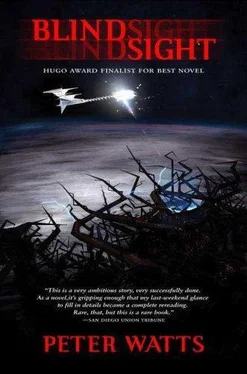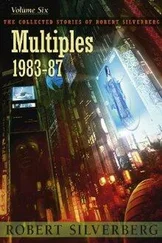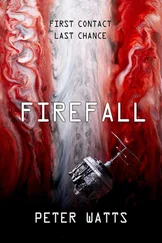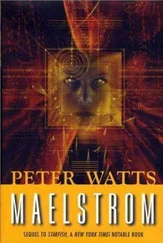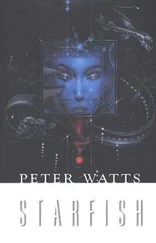“No.”
“Why not? They can fight better without you, you said that yourself! What’s the point ?”
“Can’t leave yourself a back door, Keeton. Defeats the whole purpose.” She allowed herself a small, sad smile. “They’ve breached. Go.”
She was gone, fresh alarms rising in her wake. Far towards the bow I heard the crinkle of emergency bulkheads snapping shut.
Sarasti’s undead carcass gurgled and pushed me down the spine. Four more grunts slid smoothly past and took up position behind us. I looked over my shoulder in time to see the vampire pull the handpad from the wall. But it wasn’t Sarasti at all, of course. It was the Captain — whatever was left of the Captain, this far into the fight — commandeering a peripheral interface for its own use. The optical port sprouted conspicuously from the back of Sarasti’s neck, where the cable used to go in; I remembered the drone’s maxillipeds, chewing.
The sound of weapons fire and ricochets rose behind us.
The corpse typed one-handed as we moved. I wondered briefly why it just didn’t talk before my gaze flickered back to the spike in his brain: Sarasti’s speech centers must be mush.
“Why did you kill him?” I said. A whole new alarm started up, way back in the drum. A sudden breeze tugged me backward for a moment, dissipated in the next second with a distant clang.
The corpse held out the handpad, configured for keys and a text display: Seizng. Cldnt cntrl.
We were at the shuttle locks. Robot soldiers let us pass, their attention elsewhere.
U go, the Captain said.
Someone screamed in the distance. Way off up the spine, the drum hatch slammed shut; I turned and saw a pair of distant grunts welding the seal. They seemed to move faster now than they ever had before. Maybe it was only my imagination.
The starboard shuttle lock slid back. Charybdis ’ interior lights winked on, spilling brightness into the passageway; the spine’s emergency lighting seemed even dimmer in contrast. I peered through the opening. There was almost no cabin space left — just a single open coffin jammed between coolant and fuel tanks and massive retrofitted shockpads. Charybdis had been refitted for high-G and long distance.
And me.
Sarasti’s corpse urged me on from behind. I turned and faced it.
“Was it ever him?” I asked.
Go.
“ Tell me . Did he ever speak for himself? Did he decide anything on his own? Were we ever following his orders, or was it just you all along?”
Sarasti’s undead eyes stared glassy and uncomprehending. His fingers jerked on the handpad.
U dislke ordrs frm mchnes. Happier ths way.
I let it strap me in and close the lid. I lay there in the dark, feeling my body lurch and sway as the shuttle slid into its launch slot. I withstood the sudden silence as the docking clamps let go, the jerk of acceleration that spat me hard into the vacuum, the ongoing thrust that pushed against my chest like a soft mountain. Around me the shuttle trembled in the throes of a burn that far exceeded its normative specs.
My inlays came back online. Suddenly I could see outside if I wanted. I could see what was happening behind me.
I chose not to, deliberately and fervently, and looked anyway.
Theseus was dwindling by then, even on tactical. She listed down the well, wobbling toward some enemy rendezvous that must have been intentional, some last-second maneuver to get her payload as close to target as possible. Rorschach rose to meet her, its gnarled spiky arms uncoiling , spreading as if in anticipation of an embrace. But it was the backdrop, not the players, that stole the tableau: the face of Big Ben roiling in my rearview, a seething cyclonic backdrop filling the window. Magnetic contours wound spring-tight on the overlay; Rorschach was drawing all of Ben’s magnetosphere around itself like a bright swirling cloak, twisting it into a concentrated knot that grew and brightened and bulged outward…
Like a torsion flare from an L-class dwarf, my commander had said once, but we should see anything big enough to generate that effect and the sky’s dark on that bearing. IAU calls it a statistical artefact.
As, in fact, it had been. An impact splash perhaps, or the bright brief bellow of some great energy source rebooting after a million years of dormancy. Much like this one: a solar flare, with no sun beneath it. A magnetic cannon ten thousand times stronger than nature gave it any right to be.
Both sides drew their weapons. I don’t know which fired first, or even if it mattered: how many tonnes of antimatter would it take to match something that could squeeze the power of a sun from a gas ball barely wider than Jupiter? Was Rorschach also resigned to defeat, had each side opted for a kamikaze strike on the other?
I don’t know. Big Ben got in the way just minutes before the explosion. That’s probably why I’m still alive. Ben stood between me and that burning light like a coin held against the sun.
Theseus sent everything it could, until the last microsecond. Every recorded moment of hand-to-hand combat, every last countdown, every last soul. All the moves and all the vectors. I have that telemetry. I can break it down into any number of shapes, continuous or discrete. I can transform the topology, rotate it and compress it and serve it up in dialects that any ally might be able to use. Perhaps Sarasti was right, perhaps some of it is vital.
I don’t know what any of it means.
“Species used to go extinct. Now they go on hiatus.”
—Deborah MacLennan,
Tables of our Reconstruction
“You poor guy,” Chelsea said as we went our separate ways. “Sometimes I don’t think you’ll ever be lonely.” At the time I wondered why she sounded so sad.
Now, I only wish she’d been right.
I know this hasn’t been a seamless narrative. I’ve had to shatter the story and string its fragments out along a death lasting decades. I live for only an hour of every ten thousand now, you see. I wish I didn’t have to. If only I could sleep the whole way back, avoid the agony of these brief time-lapsed resurrections.
If only I wouldn’t die in my sleep if I tried. But living bodies glitter with a lifetime’s accumulation of embedded radioisotopes, brilliant little shards that degrade cellular machinery at the molecular level. It’s not usually a problem. Living cells repair the damage as fast as it occurs. But my undead ones let those errors accumulate over time, and the journey home takes so much longer than the trip out: I lie in stasis and corrode . So the onboard kick-starts me every now and then to give my flesh the chance to stitch itself back together.
Occasionally it talks to me, recites system stats, updates me on any chatter from back home. Mostly, though, it leaves me alone with my thoughts and the machinery ticking away where my left hemisphere used to be. So I talk to myself, dictate history and opinion from real hemisphere to synthetic one: bright brief moments of awareness, long years of oblivious decay between. Maybe the whole exercise is pointless from the start, maybe no one’s even listening.
It doesn’t matter. This is what I do .
So there you have it: a memoir told from meat to machinery. A tale told to myself, for lack of someone else to take an interest.
Anyone with half a brain could tell it.
* * *
I got a letter from Dad today. General delivery, he called it. I think that was a joke, in deference to my lack of known address. He just threw it omnidirectionally into the ether and hoped it would wash over me, wherever I was.
Читать дальше
